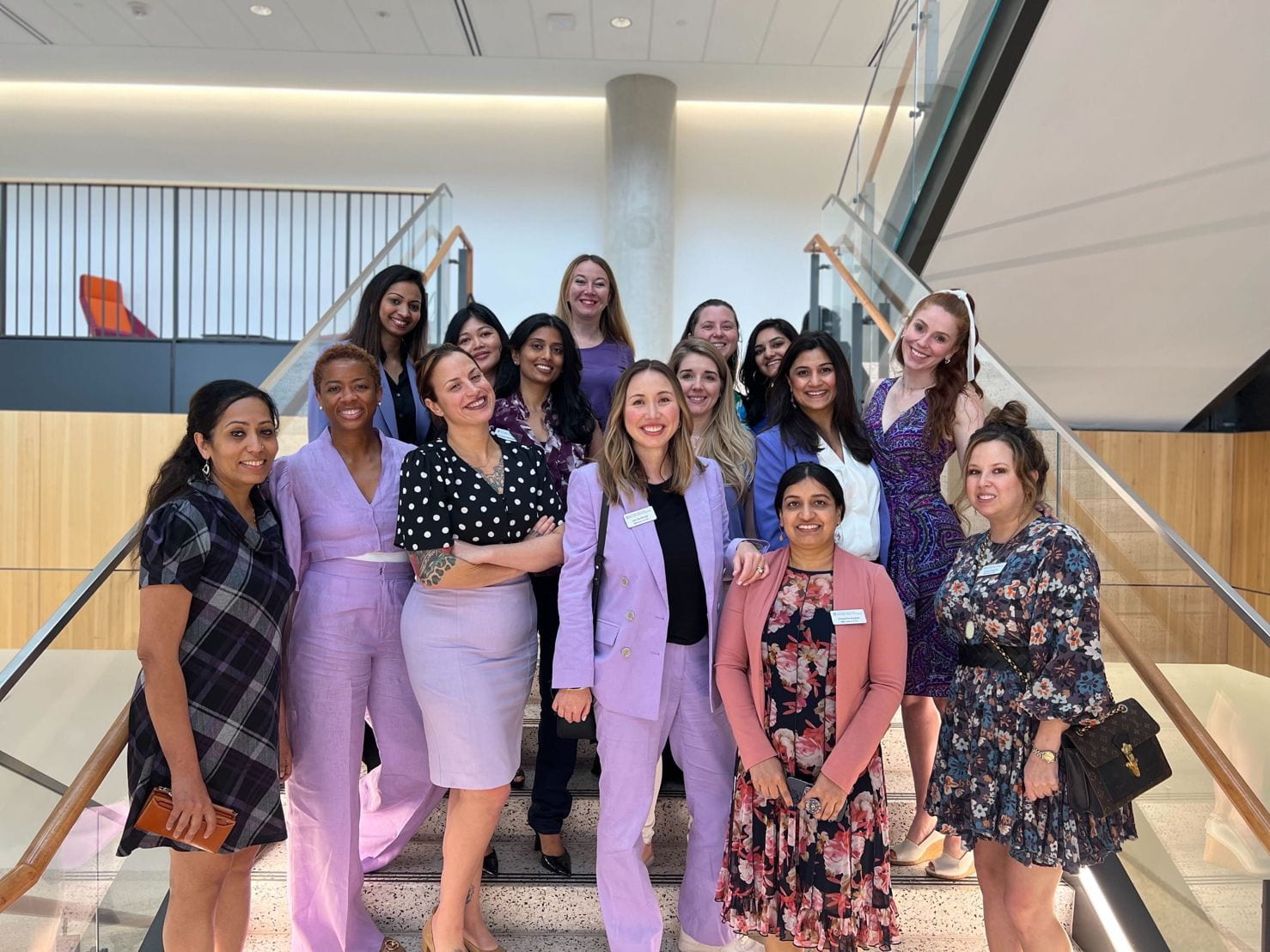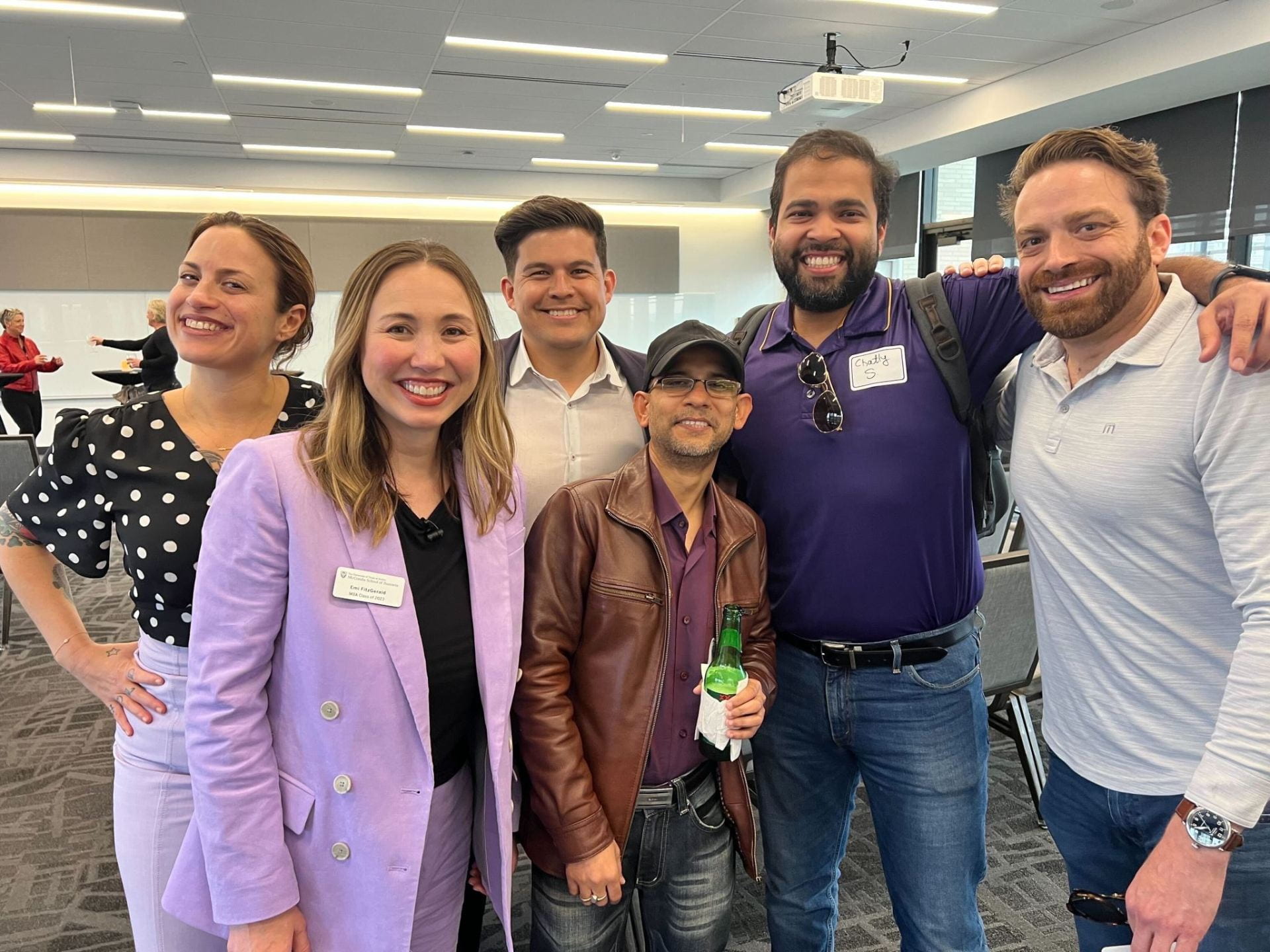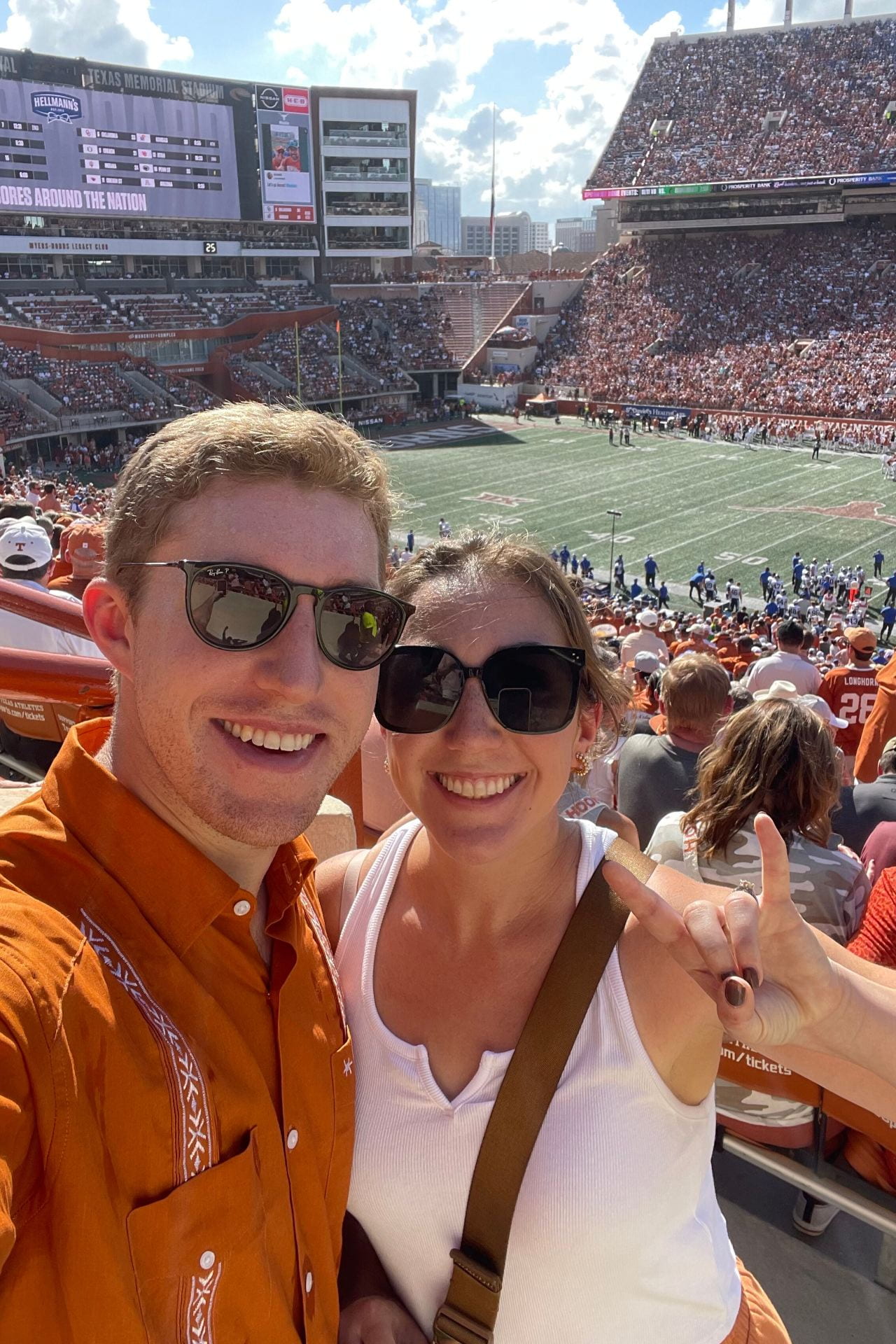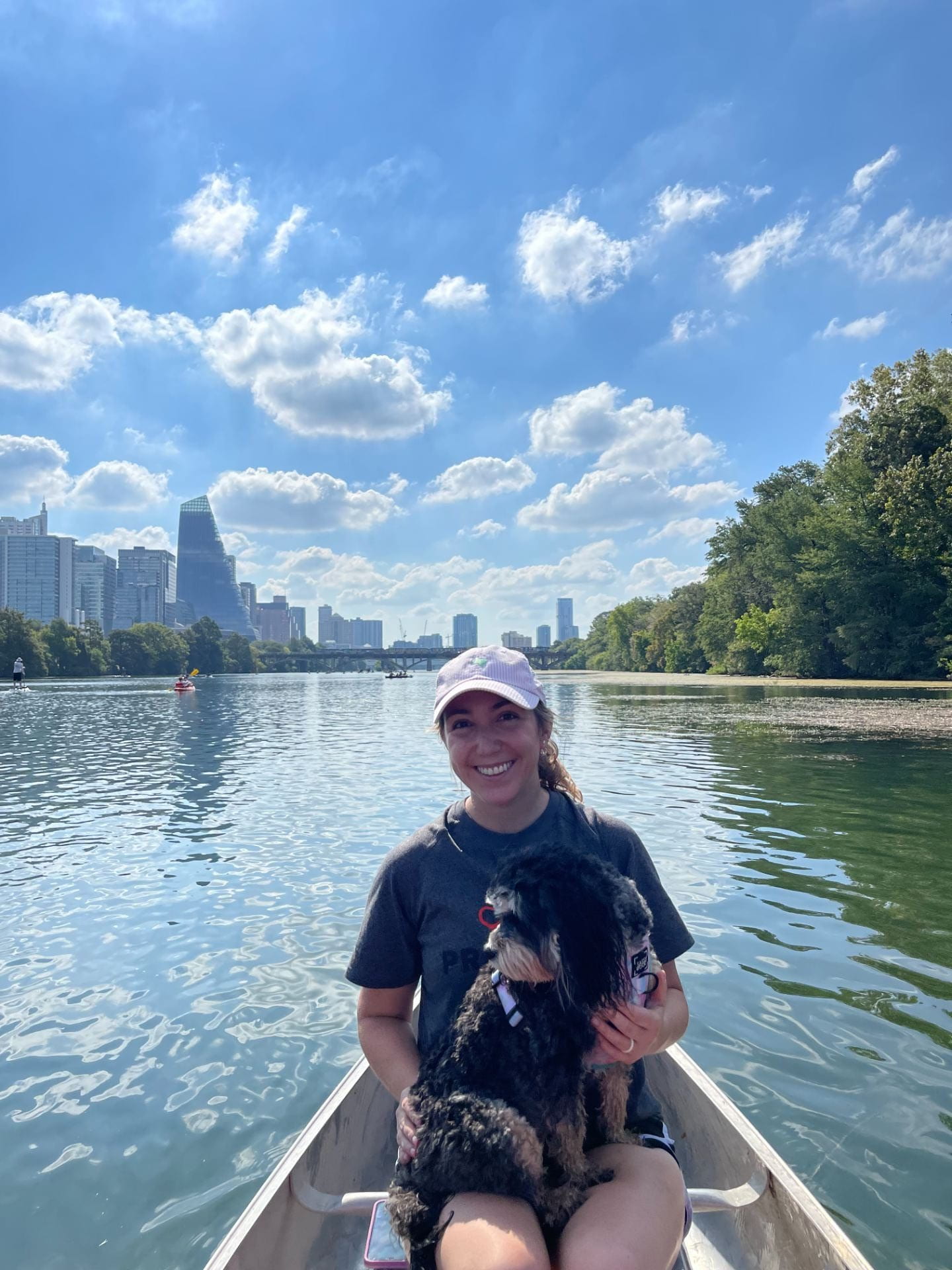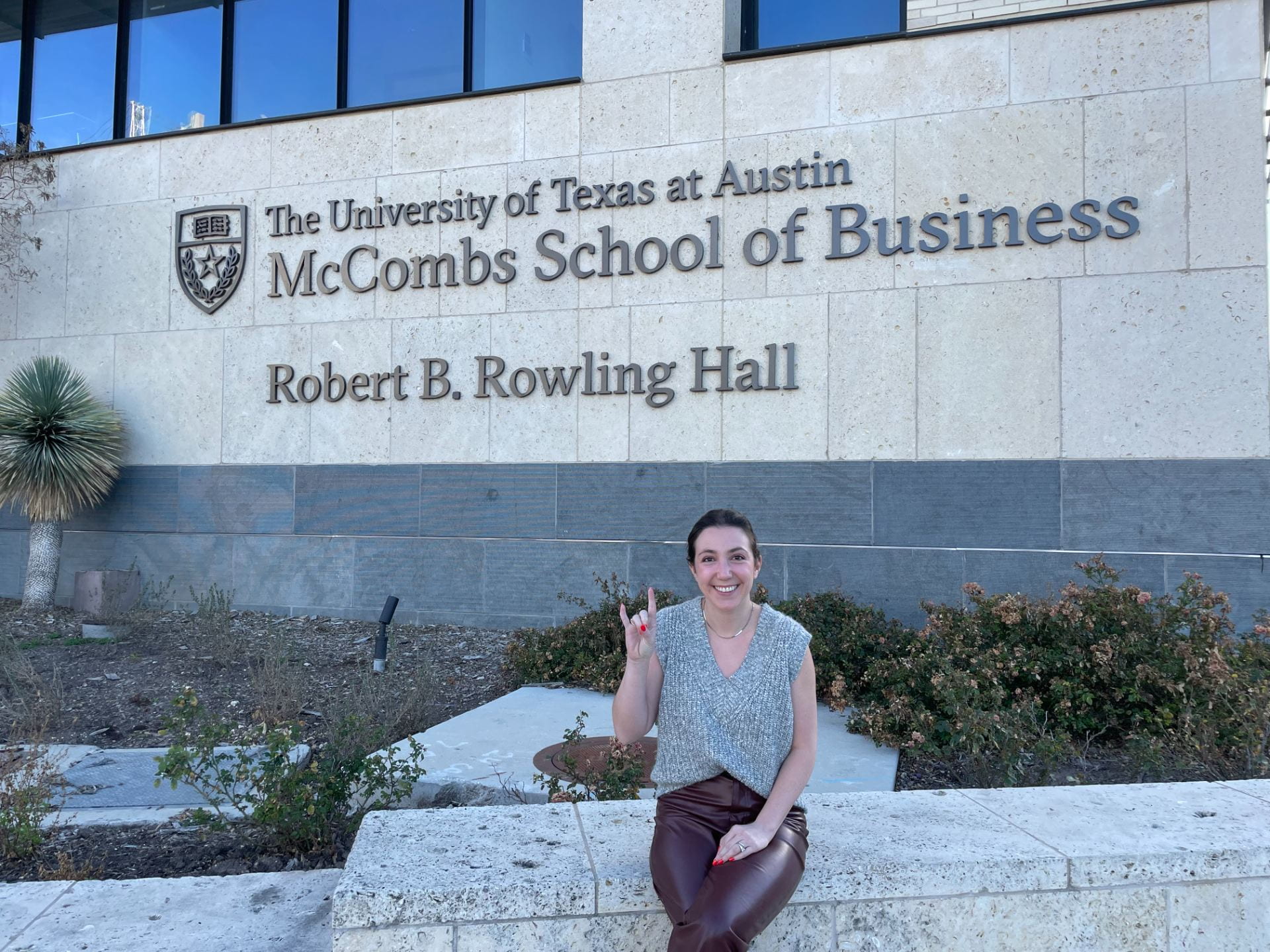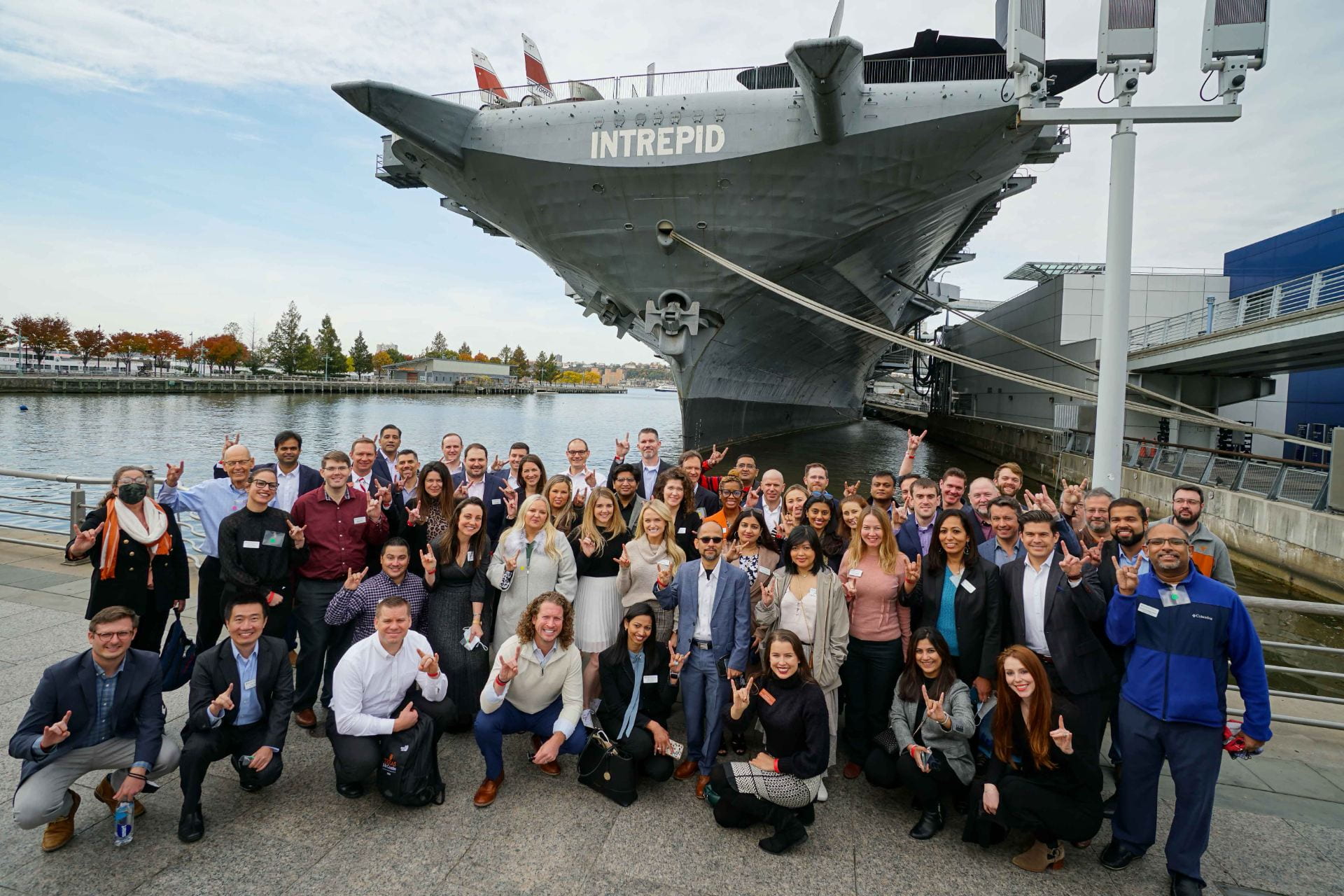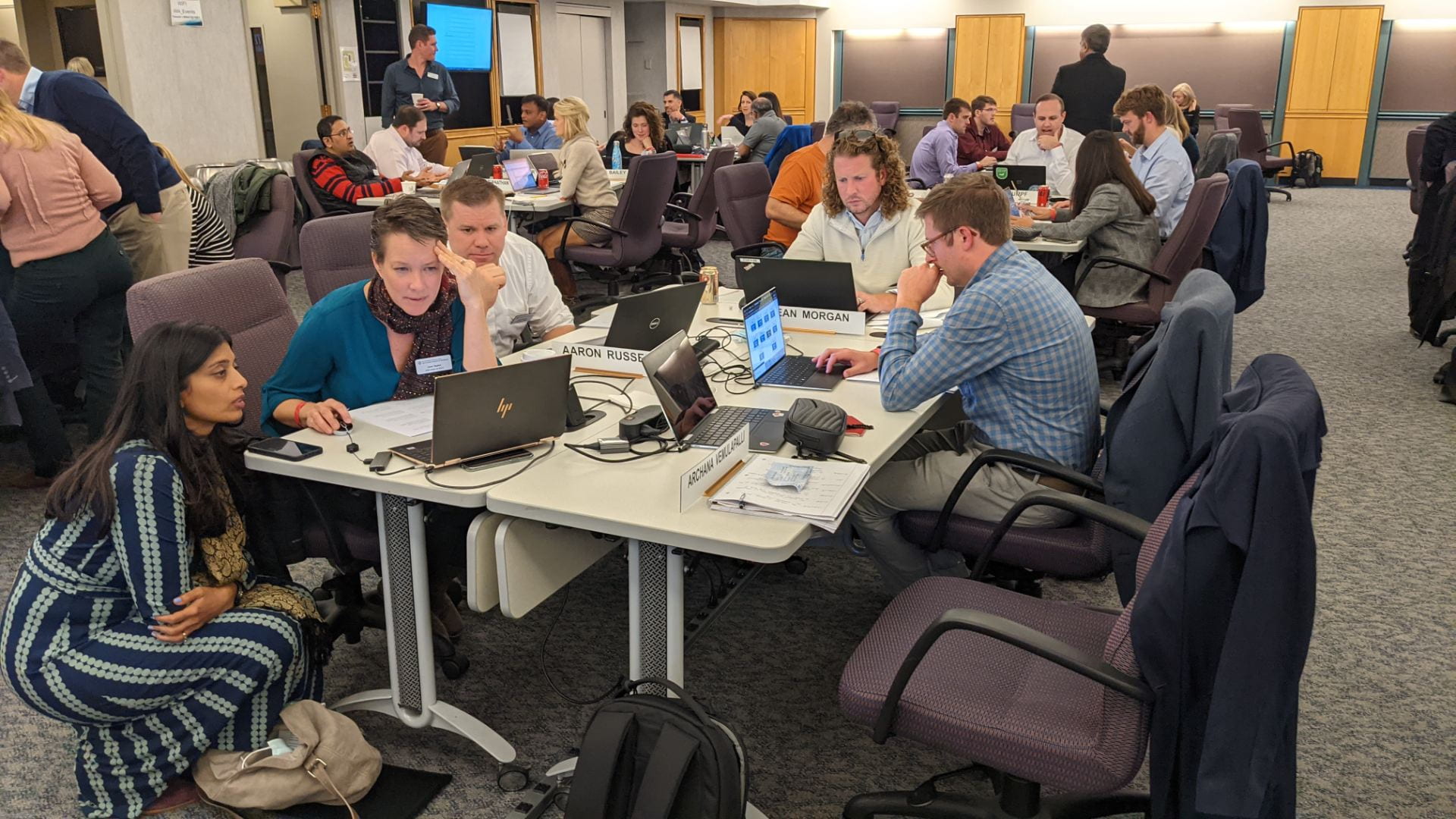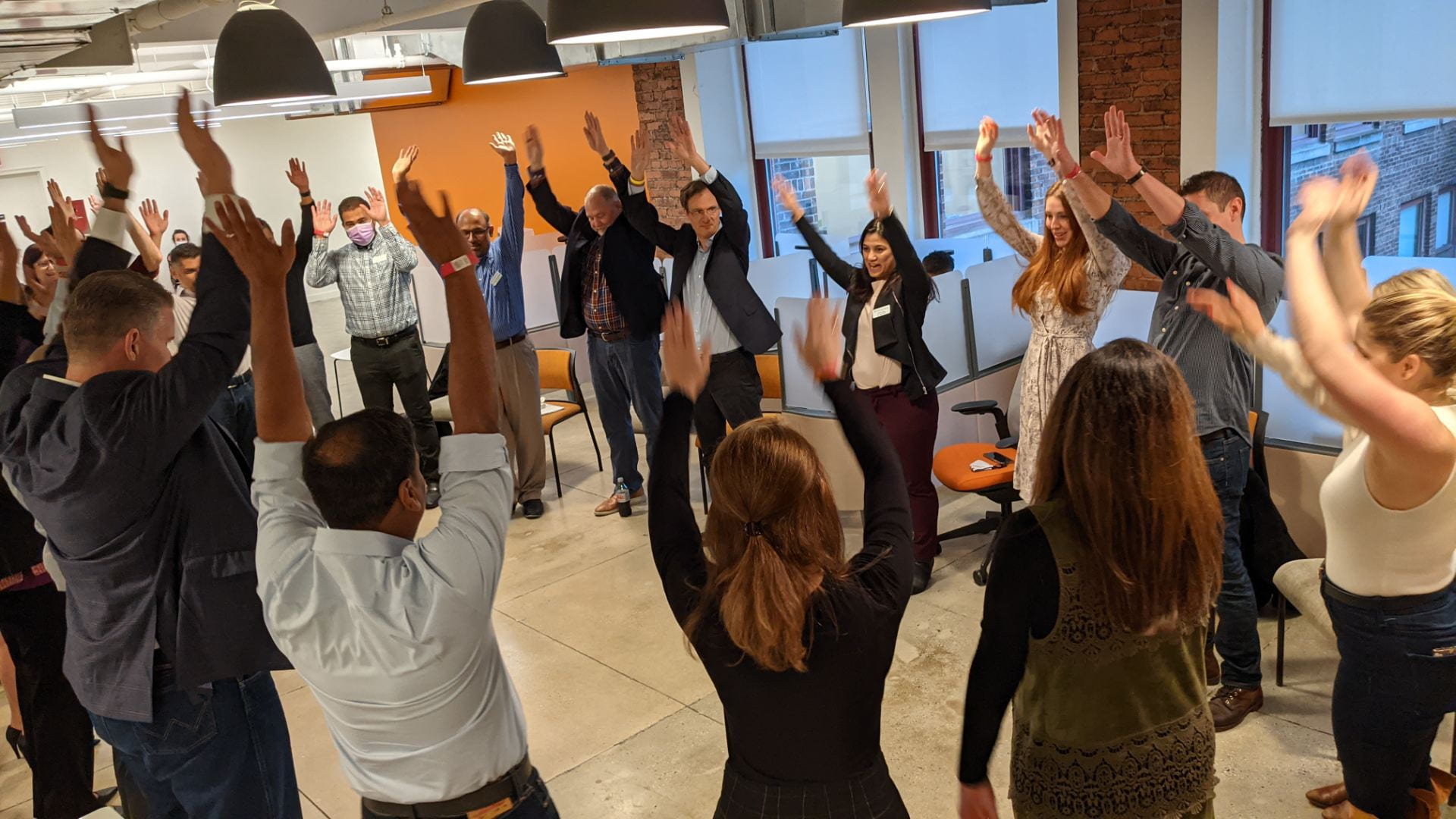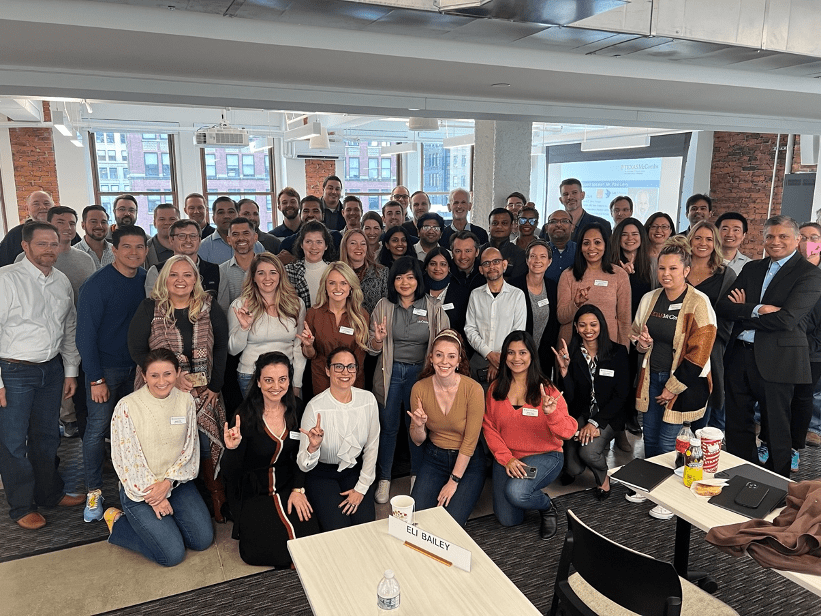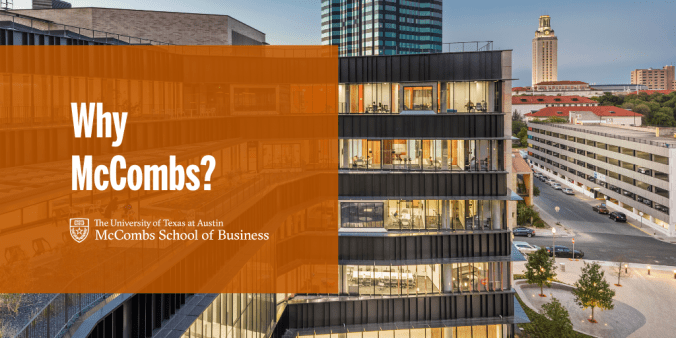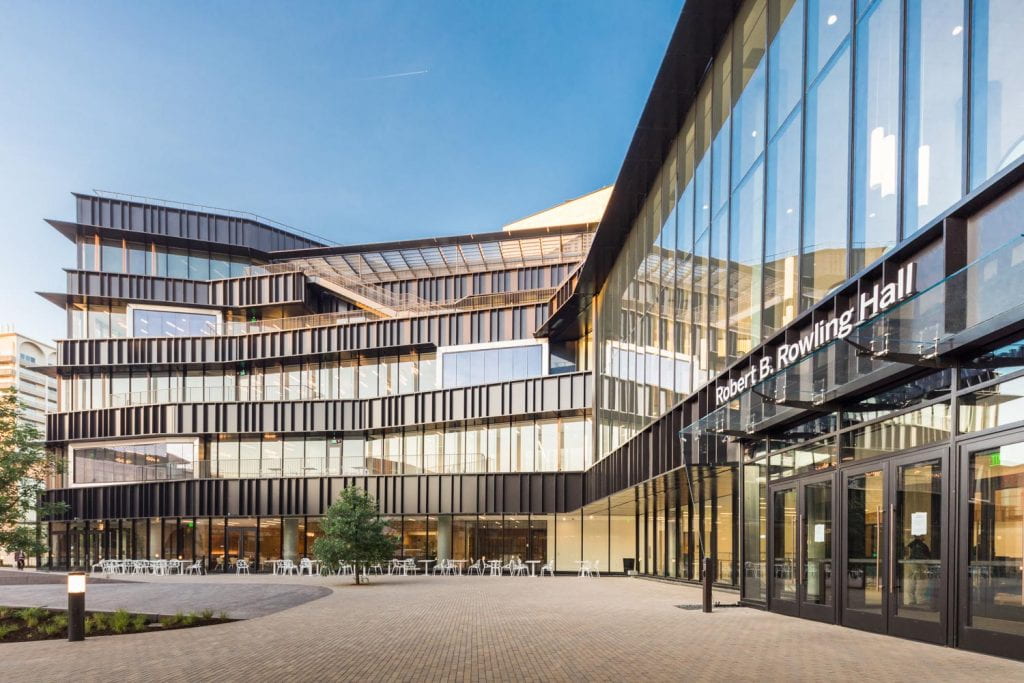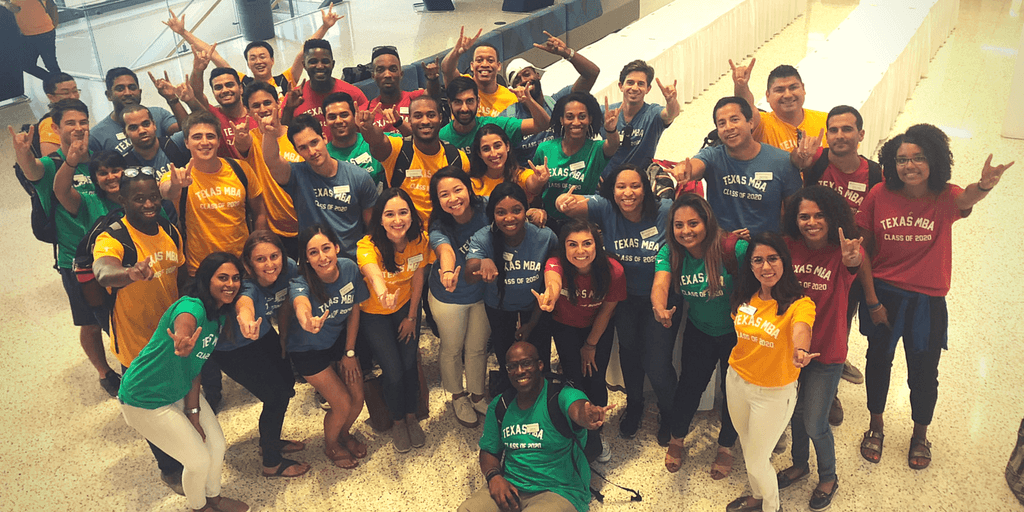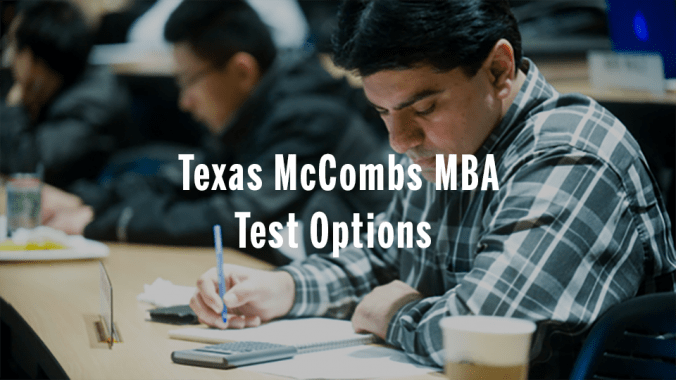Your choice of MBA program can redefine your career path, expand your influence, and accelerate your growth. Selecting the right fit isn’t just about earning a degree — it’s about unlocking the leadership potential that propels you forward.
Executive MBA and Part-Time MBA programs both empower working professionals, yet they serve distinct audiences with unique goals. Our Executive MBA program caters to mid- to aspiring senior-level leaders ready to refine strategic vision and elevate into C-suite roles. Part-Time MBAs — sometimes called Working Professional MBAs — support early- to mid-career talent looking to strengthen business administration fundamentals, pivot industries, or advance into management while maintaining full-time work.
At Texas McCombs, you don’t have to choose between career momentum and a Hildebrand MBA. Our Part-Time MBA options — Evening MBA, Weekend MBA at Dallas/Fort Worth and Weekend MBA at Houston — are purpose-built for ambitious professionals. Each program has the opportunity to leverage our innovative ecosystem, world-class faculty, and a community that’s driven to make a global impact.
What Is an Executive MBA?
An Executive MBA is built for accomplished professionals — typically with seven to 10 years of experience — who are ready to elevate from managing teams to steering organizations. You’re already influencing strategy; now you want a program that sharpens your decision-making, deepens your global perspective, and positions you for senior-level impact.
In the Texas McCombs Executive MBA, every course centers on strategic leadership. Faculty guide you through high-level analytics, innovation frameworks, and boardroom-level financial insights that translate immediately to your workplace. Because the cohort is composed of mid- and senior-level leaders from diverse industries, class discussions mirror the complexity of real business challenges, expanding your problem-solving lens beyond your own sector.
Leadership growth here goes beyond academics. You’ll gain access to executive coaching, targeted career resources, and a robust alumni network that opens doors to global opportunities. Graduates often step into C-suite roles, launch entrepreneurial ventures, or champion transformational initiatives within their organizations — proof that an Executive MBA is more than a credential; it’s a catalyst for senior-level influence.
Program Format and Immersions
Texas McCombs’ Executive MBA cohort meets one intensive weekend per month at Rowling Hall in Austin — an efficient schedule that respects your demanding calendar while immersing you in a tight-knit learning community. Yet the real signature of our EMBA program is six immersive experiences that weave together coursework, leadership practice, and global insight.
Each immersion aligns tightly with semester coursework, ensuring concepts move from the classroom to real-world context immediately. You’ll collaborate with classmates on consulting projects, meet high-level executives, and cultivate relationships that last well beyond graduation — an invaluable return on interaction that distinguishes our Executive MBA from other EMBA programs.
As a program option that blends rigorous academics, experiential learning, and global business exposure, the Texas McCombs Executive MBA empowers you to lead confidently in any boardroom.
What Is a Part-Time MBA?
A Part-Time — or Working Professional — MBA is crafted for early- to mid-career talent with typically two to eight years of experience and who prefer not to pause their career momentum for graduate studies. You’re juggling deadlines, leading projects, and eyeing your next promotion; this program lets you cultivate advanced business acumen without stepping away from the office.
The McCombs working professional coursework grounds you in core disciplines — finance, statistics, economics, marketing, operations — while layering leadership development and strategic management. What you learn in the classroom gets applied in the workplace right away, allowing you to show immediate value and accelerate your growth.
Team-based projects and hands-on simulations connect you with classmates from technology, healthcare, manufacturing, financial services, consulting, and more. This range of professional backgrounds broadens your perspective and builds a supportive network that stretches across Texas and beyond. Many graduates secure managerial roles, pivot industries, or even launch startups.
Program Flexibility and Scheduling
Texas McCombs offers three scheduling paths designed for working professionals:
- Evening MBA in Austin: Meets weekly on Monday and Tuesday evenings from 6–9 p.m., ideal if you prefer a consistent weekday routine and want to keep weekends free for family, travel, or passion projects. Located in the heart of Austin’s innovation hub, the program frequently features guest lectures from local founders and tech leaders who want to pass on business skills and proficiencies.
- Weekend MBA at Dallas/Fort Worth: Held on alternating weekends, with classes offered in Uptown Dallas on Friday evenings and all day Saturday. This format is perfect for professionals across North Texas who prefer immersive, condensed learning that minimizes weekday disruptions while still providing space to learn in-person from Austin-based professors. Proximity to major corporate headquarters in the DFW metroplex enhances coursework through company presentations and real-world case studies.
- Weekend MBA at Houston: Following the same alternating weekend schedule, with Friday-Saturday coursework designed to let you focus fully on business learning with peers before returning to work energized to apply new insights. Positioned in a key global business hub, the program offers unparalleled access to leaders in various industries. For example, sectors like energy, healthcare, aerospace, real estate, manufacturing, and consulting.
All three formats require full-time employment, ensuring classroom discussions mirror real-time business challenges. Faculty leverage this dynamic, encouraging you to apply frameworks immediately, gather feedback, and refine strategies before the next class session. Whether you prefer weeknight consistency or biweekly weekend sessions at our Dallas or Houston campuses, McCombs meets you where you are — without forcing you to compromise career progress.
Key Differences Between Executive MBA and Part-Time MBA
Both programs empower working professionals, yet the experience you’ll have — and the outcomes you can expect — vary in meaningful ways:
Experience Level
- Executive MBA: Most EMBA students bring eight+ years of professional experience, often managing departments or divisions before entering the program.
- Part-Time MBA: Candidates on average have two–eight years of experience and are preparing to move into their first managerial or senior specialist roles. It’s also common for candidates to have more than eight years of experience from a non-business field and want to gain the skills and knowledge to have a seat in the boardroom.
Career Trajectory
- Executive MBA: Designed for leadership acceleration — think VP, C-suite, or entrepreneurial founder.
- Part-Time MBA: Focuses on career growth, functional mastery, and optional pivots across industries or roles.
Program Intensity and Duration
- Both tracks span roughly two years, but the EMBA’s once-per-month weekend format compresses coursework into high-impact sessions and immersive residencies.
- Part-Time MBA spreads learning across weekly evening or biweekly weekend classes, delivering steady progress without overwhelming your calendar.
Investment
- Executive MBA: Typically requires a higher financial commitment, reflecting the exclusive immersions, executive coaching, and senior-level networking.
- Part-Time MBA: Tuition is lower, offering a strong return on investment for professionals who anticipate salary growth or role changes during the program.
Networking Ecosystem
- Executive MBA: Intake classes average 65 students — each a seasoned leader — creating intimate, high-level peer connections that often translate into board appointments or joint ventures.
- Part-Time MBA: Entering classes across Austin, Dallas, and Houston average 250 students, giving you a broader network of professionals across Texas and access to multi-program networking in electives and international trips.
Learning and Curriculum
- Executive MBA: Centers on strategic leadership, corporate governance, and enterprise-level analytics. Courses emphasize case studies that mirror boardroom dilemmas, preparing you to influence vision and organizational culture. Executive coaches and leadership diagnostics personalize your growth plan, sharpening decision-making under pressure.
- Part-Time MBA: Builds a solid foundation in finance, marketing, operations, and data analytics through lectures by expert professors and application of case studies, then layers leadership development through electives and experiential modules. Real-time application lets you apply learnings at work and return to class with fresh insights, enriching discussions for everyone.
The Hildebrand Leadership Fellows program immerses high-impact Part-Time, Executive, and Full-Time MBA students in advanced leadership workshops, industry treks, and executive mentorship, adding depth to your managerial toolkit.
Shared Strengths
Regardless of track, you access world-class faculty, hands-on projects, and the powerful Texas McCombs alumni network. Yet the balance of strategy versus fundamentals — and the caliber of your peer group — differs, guiding you toward the program that aligns best with your current role and future vision. Plus, all programs have a fall start date and walk together for graduation when wrapping up the MBA program, so you’ll start and end at the same time among your fellow students.
Ready to pinpoint your fit? Let’s explore how to evaluate personal factors like experience, goals, and time commitment before making your decision.
Determining Which MBA Program Is Right for You
Start by taking an honest inventory of where you stand today and where you intend to go next. Your level of experience, career ambitions, and life commitments all shape whether an Executive MBA or Part-Time MBA will serve you best.
Look At Your Work Experience and Career Stage
If you already lead teams, manage P&L, or influence corporate strategy, the Executive MBA’s executive-level peer group will match your pace and perspective, assuming you meet the minimum eight years of work experience. If you’re climbing toward your first management role or seeking a strategic skill set to pivot industries or functions, the Part-Time MBA delivers the business fundamentals and leadership coaching to get you there.
Have Your Desired Program Format and Time Commitment in Mind
The Executive MBA’s once-per-month weekend classes and six immersive residencies suit professionals who can carve out concentrated blocks of time, plus the potential commute. Either the Evening or Weekend MBA option disperses class time across weeknights or alternating weekends in your area, a rhythm that accommodates continuous full-time work and family obligations.
Think About Your Long-Term Goals
Aspiring C-suite leaders benefit from the EMBA’s focus on high-level strategy, global business, and peer-executive networking. Professionals planning a functional pivot or mid-career leap gain versatility through the Part-Time MBA’s broad curriculum and immediate, on-the-job application.
Experience McCombs Culture Firsthand
Sit in on a class, connect with current MBA students, or attend an admissions event to test-drive each program’s environment. Engage with admissions consulting resources or review tuition overviews to ensure the investment aligns with your personal and financial plan.
Explore Texas McCombs MBA Programs: Making Your Academics Work for You
Executive MBA or Part-Time MBA — each Hildebrand MBA path at Texas McCombs empowers working professionals to lead with vision and agility. The Executive MBA delivers an immersive, strategy-focused journey alongside seasoned executives. The Part-Time MBA offers flexible evening and weekend classes that let you master business fundamentals while advancing your career. Both share world-class faculty, a collaborative community, and access to Austin’s innovative economy. Additionally, all programs start with an orientation and coursework kick-off in Austin and end with an MBA graduation together.
No matter your career stage, you’ll find a program engineered for growth. Our Hildebrand MBA initiatives, leadership fellows’ experiences, and global immersions ensure every McCombs student develops the insight and confidence to drive meaningful change.
Ready to discover your perfect MBA program fit? Explore the Executive MBA, Evening MBA, and Weekend MBA options in Dallas and Houston today, and see how a Texas McCombs School of Business degree propels you toward your next leadership milestone.


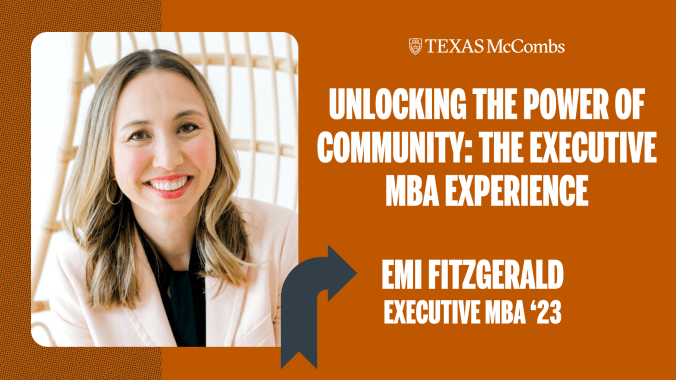
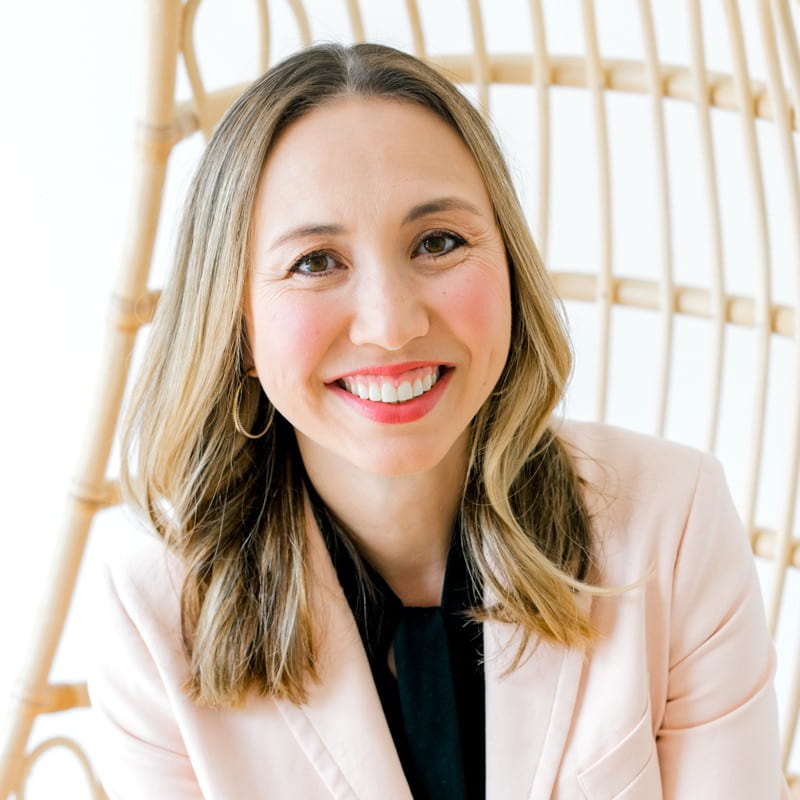 Emiko FitzGerald, Executive MBA Class of 2023, made strong connections while at McCombs. Recognized as one of
Emiko FitzGerald, Executive MBA Class of 2023, made strong connections while at McCombs. Recognized as one of 